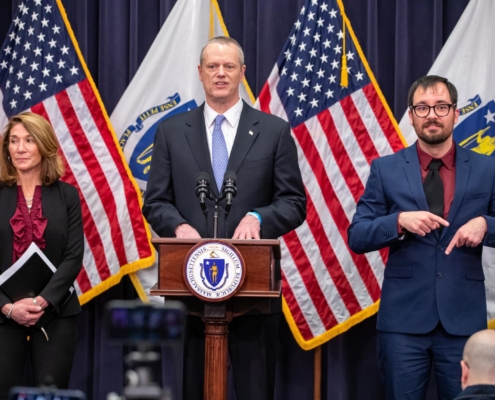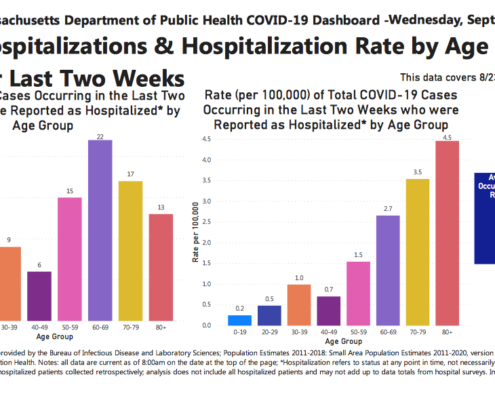Pioneer Urges Future COVID-19 Study and Recommendations Task Force to Consider Impact on Nursing Home Residents
Read coverage of these recommendations in The Boston Globe.
BOSTON – After over 5,000 people have died of COVID-19 in Massachusetts nursing homes, Pioneer Institute is issuing an open letter to the state’s future COVID-19 health equity task force that outlines an extensive list of recommendations on infection control and preparedness in eldercare facilities.
The Institute’s recommendations focus on the need for enhanced state oversight and transparency of nursing home protocols at the state level, as well as implementation of additional infection control and preparedness measures. The task force was established by legislation signed by the governor earlier this month.
“COVID has wiped out 10 percent of Massachusetts’ nursing home population. Going forward, the state needs to take affirmative steps to control infection and prepare nursing homes for the duration of the pandemic and beyond,” said Pioneer Senior Healthcare Fellow Barbara Anthony, who co-authored the letter with Mary Connaughton, Pioneer’s Director of Government Transparency, and Research Assistant Andrew Mikula.
Many of Pioneer’s recommendations highlight the long-term implications of nursing home oversight reforms, including the designation of both state officials and nursing home staff members dedicated to infection control and prevention in the facilities. Pioneer calls for a single person, with no other responsibilities and answerable directly to the Governor, to be appointed to oversee the state’s response to COVID in nursing homes. The Institute also urges action to prioritize nursing home residents and staff for vaccination once a COVID vaccine is available.
The letter highlights multiple state practices that increased nursing home residents’ vulnerability to the pandemic. The state had offered additional funding to nursing homes that accepted transfers of patients with the virus from hospitals, and research shows that facilities approved for these transfers disproportionately received poor evaluations from the U.S. Centers for Medicare and Medicaid Services (CMS). The letter also raises questions regarding how the CMS’s standards for infection control in nursing homes were applied in state and federal surveys predating the pandemic.
“There’s a glaring contrast between the state’s hypervigilant closure of the schools and preparations in the hospitals, on the one hand, and insufficient preparation in eldercare facilities on the other,” said Pioneer Executive Director Jim Stergios. “Given the risk profile of eldercare residents, we hope that lessons learned in the first wave of the pandemic translate to permanent reforms in Massachusetts nursing homes.”
The more than 60 percent of Massachusetts COVID deaths that are associated with long-term care facilities is significantly higher than the national rate. To prevent the further spread of this and other viruses in nursing homes, Pioneer believes the state must adopt a number of stringent infection control protocols. These include preventing staff from working at multiple facilities at a time if one of them has an outbreak, requiring facilities to be able to form units to isolate sick residents, and evaluating existing regulations via visual inspection, as opposed to relying on self-certification.
“We believe the future COVID-19 study and recommendations task force has a significant role to play to further an examination of what went wrong with the state’s response to COVID in nursing homes, to identify the steps the state must take to rectify ongoing problems, and to prevent a repeat of this tragedy ever again,” Anthony said.
About the Authors:
Barbara Anthony, lawyer, economist, and public policy expert, is a Senior Fellow in Healthcare Policy at Pioneer Institute. She was also a former Senior Fellow and Associate at the Harvard Kennedy School’s Center for Business and Government. She served as Massachusetts Undersecretary of the Office of Consumer Affairs and Business Regulation from 2009 to 2015 and has worked at the intersection of federal and state commercial regulation and the business community for many years.
Mary Z. Connaughton is Pioneer’s Director of Government Transparency and Director of Finance and Administration. Mary served on the former Massachusetts Turnpike Authority board of directors, was a member of the Massachusetts Commission on Judicial Conduct, and was on the board of directors of Commonwealth Corporation. She was Chief Financial Officer of the Massachusetts State Lottery and served in the State Treasurer’s Office.
Andrew Mikula is a Research Assistant at Pioneer Institute. Mr. Mikula was previously a Roger Perry Government Transparency Intern at Pioneer Institute and studied economics at Bates College.
Mission
Pioneer Institute develops and communicates dynamic ideas that advance prosperity and a vibrant civic life in Massachusetts and beyond.
Vision
Success for Pioneer is when the citizens of our state and nation prosper and our society thrives because we enjoy world-class options in education, healthcare, transportation and economic opportunity, and when our government is limited, accountable and transparent.
Values
Pioneer believes that America is at its best when our citizenry is well-educated, committed to liberty, personal responsibility, and free enterprise, and both willing and able to test their beliefs based on facts and the free exchange of ideas.
Get Our COVID-19 News, Tips & Resources!
Related Research










